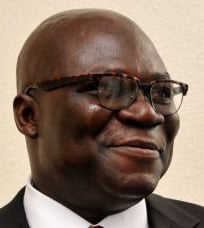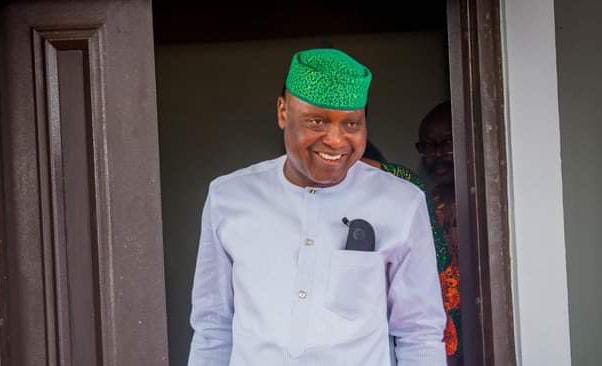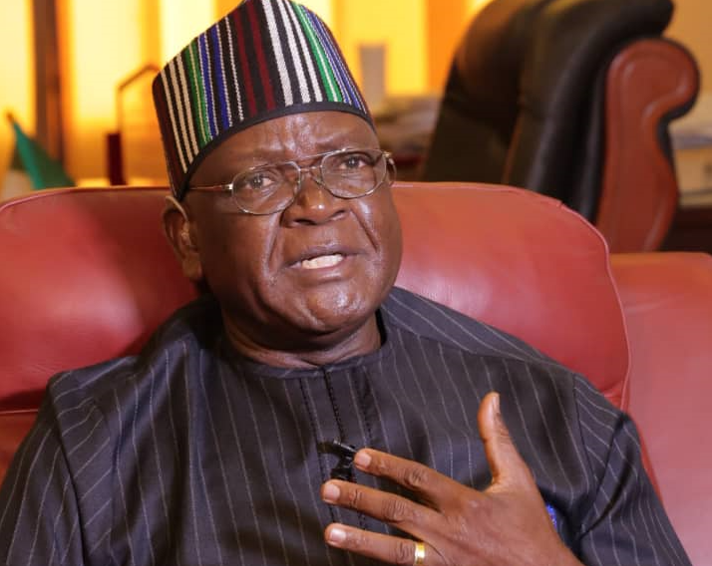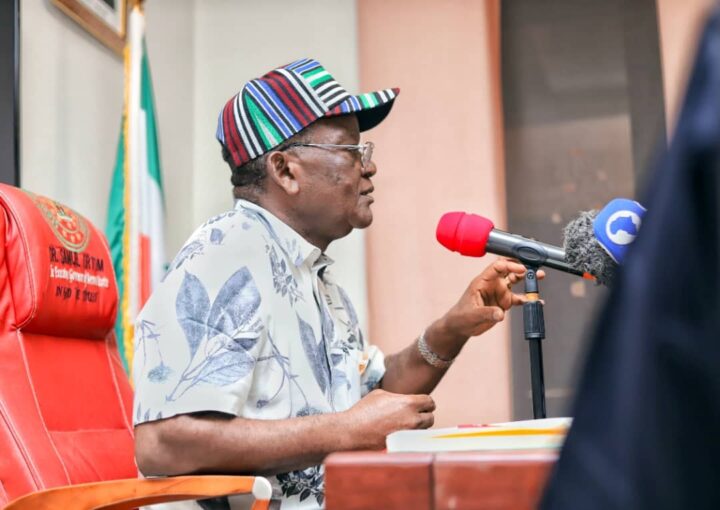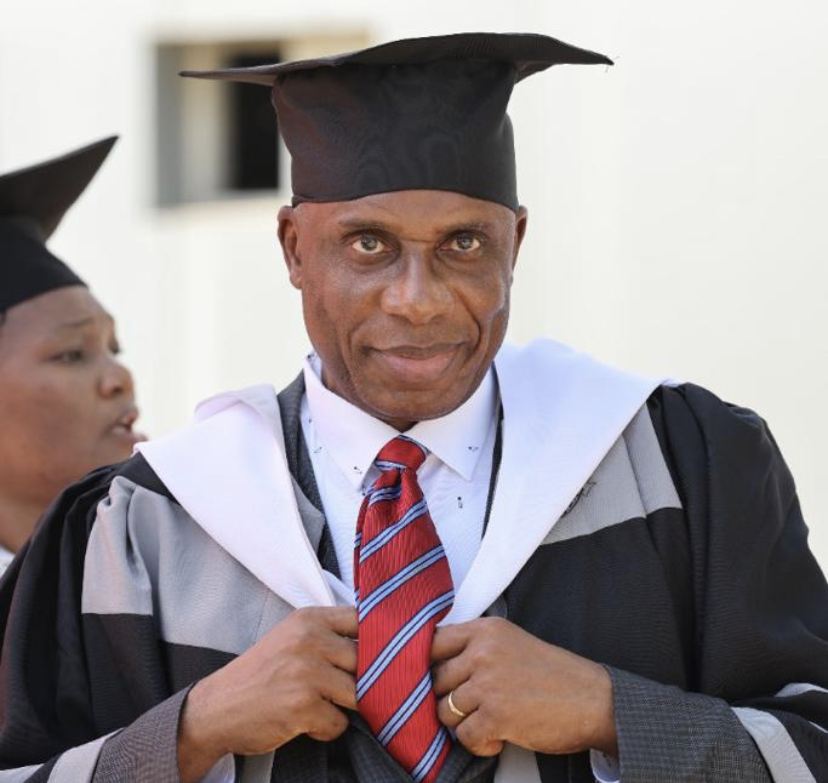On October 16, 2022, former Governor Kayode Fayemi of Ekiti state handed over power at a colourful ceremony attended by big wigs of the All Progressives Congress (APC) and others to Mr. Biodun Abayomi Oyebanji, the former Secretary to the Ekiti State Government who emerged as Governor-elect in the state’s June 18 Governorship election. Fayemi had completed his maximum two terms as Governor. He served as Governor, 2010 -2014, and also from October 2018 to October 2022. In-between, he was Nigeria’s Minister of Solid Minerals Development. But since his departure in October, it may be correct to say that Ekiti has not been able to settle down to governance.
The shadow of the past hangs ominously over the present, complicating the crisis that we have seen in the difficulty of appointing/electing a new Speaker for the Ekiti State House of Assembly. Students of Nigeria’s democratic process would readily admit that this is nothing new: getting a new Speaker for a State House of Assembly is always a war-like venture. The House of Assembly, the legislative assembly in the states, performs an oversight function over governments at that level, in addition to making good laws for good governance in defence of the people’s interest. But this is also precisely why governors, Godfathers and other stakeholders are perpetually interested in the leadership of the legislature. No reasonable Governor or his Godfathers would ever allow the legislature to fall into the hands of contrarian figures who in a moment or dangerous self-assertiveness could plot against the Executive arm and wrong-foot the Governor by holding him to ransom, impeach him or make it impossible for him to govern.
In a more recent case in Edo State, police had to take over the Edo State House of Assembly as the members fought for control. For more than two years, 14 elected lawmakers were shut out of the Assembly by their own colleagues. The ensuing drama was sordid, ugly, unbelievable. One fateful morning in August 2020, some unknown persons who have remained unknown two years after the fact, removed the entire roof of the State House of Assembly, and made away with the legislative Mace. There were stories of impeachments and counter impeachments. At the time, Governor Godwin Obaseki had left the ruling All Progressives Congress (APC) and was seeking re-election on the platform of the People’s Democratic Party (PDP). Similar dramas had been enacted elsewhere since 1999. In Plateau State for example, five Speakers of the House of Assembly were either impeached or forced to resign at various times between 2000 and 2021.
In Kogi, Plateau, Imo (four Speakers in three years!), Ebonyi and Enugu and elsewhere, the impeachment of the Speaker has been used as a crude weapon to keep the legislature in check and remind members of the legislature that they are not as independent as the Constitution makes them to be. The sociology of the power game is such that the leadership of the State House of Assembly is expected to be absolutely loyal to the Governor and his power bloc within the state, and that includes the Governor’s Godfathers, supporters and even family members. The State House of Assembly is expected to do whatever the Governor and his people want not to act as a watchdog, barking from the pages of the Constitution. To show how serious this is, it is important to note that in 2015, the Ebonyi State House of Assembly was set ablaze due to disagreements between the Executive and the legislature. Governors do not fold their arms once they perceive any form of assertiveness from the House so as not to have the ugly experience of impeachment as had happened in Bayelsa and Oyo States. The legislative arm of government in Nigeria since the First Republic has indeed been an arena for chaos, motor park politics, scuffles, rancour and free for all fights. It is worse today, and it promises to get even more problematic.
Advertisement
The latest under the present dispensation is the on-going drama in the Ekiti State House of Assembly. Following the death of the former Speaker of the Ekiti State House of Assembly, Hon. Funminiyi Afuye, 66, from Ikere Constituency 1, on October 19, 2022, the leaders of the APC in Ekiti State, comprising former APC Governors Kayode Fayemi, former Governor Niyi Adebayo, now Minister of Industry, Trade and Investment, Chairman of the party, Paul Omotoso and the incumbent Governor, Abiodun Oyebanji had resolved that the unfinished tenure of Afuye, should be completed by someone from his South Senatorial District, precisely Emure Constituency, in order to preserve the slot for the people of that area. The leaders therefore anointed Mrs Bunmi Adelugba as Afuye’s successor. This is ironic considering the fact that the elected deputy Governor, Monisade Afuye is from the same political constituency as the late Speaker of the House, although not a relation of his. Nigeria’s power sharing calculus and political arrangements can be utterly befuddling, and political godfathers thrive on this.
But as it turned out on the floor of the House, the Clerk of the House provided ballot papers, and rejected the voice vote proposed by the elders, and during the vote, instead of a coronation as ordered by the powers-that-be, the Clerk announced two candidates – Aribisogan and Adelugba. The Clerk said members would vote using the ballot papers. Aribisogan who had in fact been mandated after a meeting with all the 25 members of the House to nominate and support Hon Olubunmi Adelugba, emerged the eventual winner. The elders and the party felt betrayed. They refused to recognize him. Aribisogan has quite some history as a perpetual outlier. He got into the House of Assembly in June 2015 on the platform of the People’s Democratic Party (PDP). For always trying to assert himself, he was suspended from the House from 2016 – October 11, 2018, under the then Governor Ayo Fayose administration. In 2019, he defected to the APC and returned to the House when Fayemi became Governor for a second term under the platform of the APC. In the on-going drama, he and his supporters are again in the eye of the storm.
Yesterday, six days after he assumed the Speakership of the Ekiti State House of Assembly, he was impeached by a 17-member majority. He and 6 others were immediately suspended that is: Gboyega Aribisogan (Ikole 1), Tajudeen Akingbolu (Ekiti West 1), Goke Olajide (Efon) Yemisi Ayokunle (Ekiti Southwest 1), Adeyemi Raphael Ajibade (Moba 1) , Kemi Balogun (Ado 1), and Tope Ogunleye (Ilejemeje). They were suspended without pay with immediate effect. They were further barred from getting anywhere close to 1.5 km radius of the premises of the House of Assembly Complex. The suspended members were also asked to hand over properties of the government in their possession and should they wish to be reabsorbed, they must write a letter of apology to the leadership of the House!
Advertisement
The lawmakers promptly elected a new Speaker, Rt. Hon. Olubunmi Adelugba, as dictated by the powers-that-be. The House also immediately passed the Supplementary Budget for the state, and assigned the 2023 Budget to the Appropriation Committee. One of Aribisogan’s crimes was that he blocked the passage of the 2022 Supplementary Appropriation Bill., in addition to he and his gang, “causing disaffection, tension and apprehension… and importing hoodlums armed with dangerous weapons into the gallery and chambers of the complex.” It was said that in fact on Monday, November 14, Hon. Aribisogan and his men brought juju men to the Ekiti State House of Assembly at 2 am! Rt. Hon. Olubunmi Adelugba, yesterday’s beneficiary of the Ekiti chaos, is now the first female Speaker of the Ekiti State House of Assembly since the return to democracy in 1999. Immediately after her election, Mrs. Adelugba led all her colleagues, the ones not suspended, to the state secretariat of the APC, to officially report to party leaders of the APC in Ekiti State!
What is on display in Ekiti State is absolute tyranny. Ekiti is currently a one-party state. All the members of the State House of Assembly, now 25 after Afuye’s death are members of the APC. But nobody is allowed to have an independent opinion. The party dictates everything, and this is the misfortune that Aribisogan and gang have suffered. I have no dog in their fight, but I assume that for Nigeria’s democracy to grow, it must be possible at both Federal and sub-national levels to allow an interplay of ideas and to allow those who have oversight roles to do their bit without the imposition of portions by party leaders. I am particularly shocked that Kayode Fayemi’s name is being mentioned in connection with the current confusion in Ekiti State, confusion yes, because we may not have heard the last details of it.
After serving as Governor, and as a Federal Minister, what else could Kayode Fayemi be looking for? He is capable of defending himself as robustly as he chooses – I know that – but I guess it is utterly beneath him to behave like the typical Nigerian politician, who after leaving office behaves like a man without a second address. Fayemi should allow Oyebanji to sink or swim on his own steam. He should move on, and let the new players in Ekiti write their own testimonials. He should avoid being dragged into the emerging mess in Ekiti. If he is bored, let him write another book. If he doesn’t want that, let him go on a vacation with Bisi Fayemi, the woman who has stood by him through thick and thin. If that is not enough, let him throw himself into the campaign of the APC Presidential candidate, Bola Ahmed Tinubu. I understand that may be a bit tough, Tinubu having been surrounded by an evil-minded band of blood-thirsty sharks, sycophants, and intellectual shamanists, but that team can be oxygenated with a few brilliant persons like Fayemi. It is time to rise above this village, ara-oke, back of beyond politics.
Fayemi should remember Aribisogan’s swan song. He said on television: “The majority of members of Assembly voted for me but few of them who felt perhaps I did not follow the directive of the former Governor, Dr. Fayemi thought that they would make the state ungovernable for even the administration. I didn’t have any quarrel with him. I sent a message to him even last night asking: What is happening? Am I no longer one of your loyalists? Why did you not congratulate me? Up till now that I’m speaking, he has not done anything. Otherwise, he has been going around calling our members to go and impeach me tomorrow. That is the truth.”
Advertisement
As of this moment, Aribisogan already has all the answers that he seeks. Let him deal with the truth. It should be of interest to him in particular that former Governor Fayemi has already tried to explain his role in the matter, speaking yesterday through one Ahmad Sajoh of his Abuja Media Office who said: “Fayemi Had No Hand In The Impeachment of Ekiti Speaker”. As he puts it: “We note the allegation by the former Speaker of the Ekiti State House of Assembly, Mr. Gboyega Aribisogan, that his impeachment was masterminded by Dr. Kayode Fayemi, the immediate past Governor of the State. We wish to clarify that Dr. Fayemi had nothing to do with the removal of the former Speaker by his peers as this was the internal arrangement of the State House of Assembly. We wish to note that even as Governor, Dr. Fayemi did not interfere with the independence of the House and respected the principle of separation of powers of where the House had freedom to decide on their internal affairs.”
Please, please, and please: even if Fayemi has his hand, nose, legs, mouth and full chest in the matter, do we expect him to say so? Our concern is that the people of Ekiti State do not deserve to be held down by the politics of ego and difference. They deserve better. Ekiti has a very poor population. It is one of the smallest states in Nigeria. It is also one of the poorest. Ekiti is in need of development and leadership. The earlier Oyebanji began to focus on that, the better. On the day of his inauguration on October 16, 2022, he promised to run an all-inclusive government that would guarantee prosperity, abundance, unity and equity and transform Ekiti into a microcosm of development. He needs to be reminded of all those promises in case he has forgotten so soon. The people of Ekiti deserve good governance, not noise, chaos and ego conflicts.
World Cup in Qatar
The 22nd edition of the FIFA football World Cup currently taking place in Qatar, the first-ever edition of the World Cup in the Middle East, is causing so much self-inflicted catarrh in the Western media due to the attempt by that wing of media practice to do everything possible to discredit the hosting of the World Cup by the Middle Eastern country. It has been said that Qatar “bought” the World Cup for sports-washing purposes, or that it is all about the money, and questions have been raised about LGBTQ+ rights, the treatment of migrant workers, human rights records of the Qatari government and the legitimacy of the entire event in the desert.
On Sunday, the games began. FIFA had warned before then that everyone should focus on the sports – football, not politics. In the end, I think what would be played up would be the hypocrisy of the West, and how the game itself would drown out every other ancillary matter and create a history of its own, which is already the case. What we may well remember hereafter is not the hypocrisy of the West but the special moments of the tournament. On Sunday, the BBC practically ignored the opening ceremony of the World Cup. Major European countries have vowed not to show the matches in public places. Celebrities like Morgan Freeman and David Beckham who chose to identify with the Qatar World Cup have been vilified. But when it suits them, European leaders in the UK and France do business with Qatar. They even collect gifts from its rulers. They run to the country to look for gas supplies or to sell arms. We live most certainly in an unequal world where some countries believe that they can set standards for others as it suits them. In hosting this year’s World Cup, the Qataris are insisting on their own standards and sticking to them, on their own terms, putting a fresh accent on Samuel P. Huntington’s The Clash of Civilizations and Edward W. Said’s prognostications in his book, Culture and Imperialism.
Advertisement
The Qataris have insisted that nobody can drink beer or alcohol anywhere within the perimeters of the stadiums. Beer or no beer, history is already being made. Qatar is now in the history books as the first host country to lose an opening match. Yesterday, England walloped Iran 6-2. The Iran team refused to sing their country’s national anthem in protest. They are obviously in Qatar for politics not football. Mane-less Senegal got beaten 0- 2 by the Netherlands. The last time Wales was in the World Cup was 1958. Yesterday evening, it was Wales 1- USA – 1. Football is worse than opium.
Advertisement
Views expressed by contributors are strictly personal and not of TheCable.
Add a comment
